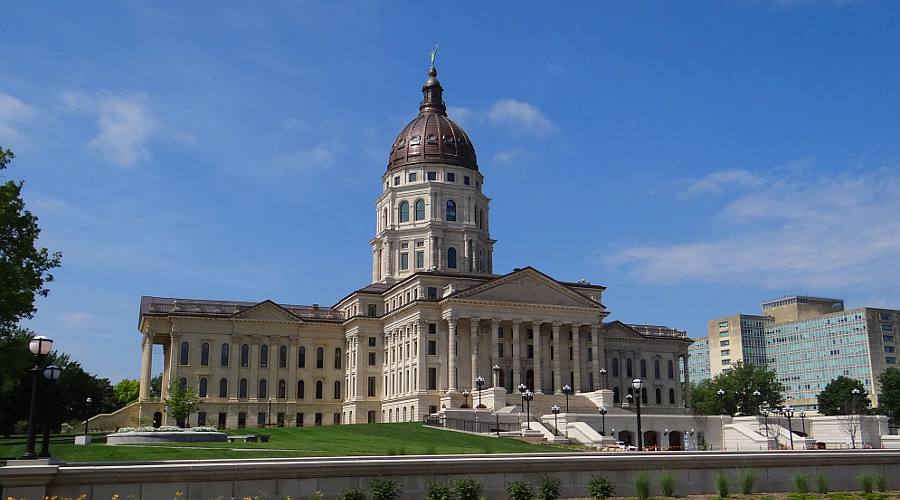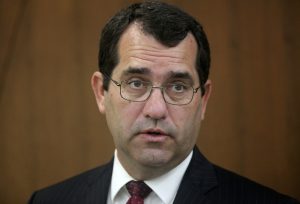Medicaid expansion fight delaying work on next Kansas budget

TOPEKA, Kan. (AP) — A legislative fight over expanding Medicaid in Kansas is delaying approval of the state’s next annual budget as expansion supporters try to keep Republican opponents from blocking it for another year.
Some top GOP lawmakers are conceding that an expansion plan could pass because expansion is a priority for Democratic Gov. Laura Kelly and has bipartisan support in the Republican-controlled Legislature. However, opponents hope for time this summer and fallto develop a smaller program than Kelly wants with restrictions she opposes, such as a work requirement for participants.
Expansion became a sticking point in budget negotiations between the House and Senate, causing lawmakers to put off votes until May on any part of the state’s spending blueprint for the fiscal year beginning in July. Potential expansion costs are hotly debated, but the disagreement in budget talks is over how much to tie Kelly’s hands as she pursues expansion this year.
“We have a Democrat governor,” Senate Majority Leader Jim Denning, a conservative Kansas City-area Republican. “There will be a time when we won’t be able to maneuver around it.”
Supporters argue that Medicaid expansion will benefit working-class families, help struggling rural hospitals and boost the economy with an influx of federal funds. Opponents predict expansion will prove far more expensive than advertised, even with the 2010 federal Affordable Care Act’s promise that the federal government would cover 90 percent of the cost.
Thirty-six states, including GOP-led ones, have expanded Medicaid or have seen voters approve ballot initiatives.
In Kansas, Republicans who oppose expansion still hold key positions in both chambers and prevented even a committee vote for weeks. However, supporters forced a debate in the House last month, and it passed a modified version of Kelly’s expansion plan over GOP leaders’ objections.
The Senate didn’t take up the measure before lawmakers began their annual spring break Saturday. However, Senate Minority Leader Anthony Hensley, a Topeka Democrat, notified colleagues that he will try to pull it out of committee May 1, when legislators reconvene to wrap up business for the year.
In arguing for further delay, GOP leaders note that Republican-led Utah is pursuing a scaled-back version of an expansion approved by voters last year to control the potential costs.
Kelly’s administration projects that her plan to extend Medicaid health coverage to as many as 150,000 more Kansas residents would come with a net cost of the state of $34 million in the program’s first full year. Top Republicans are skeptical and believe the net cost easily could be twice as much.
They also want Kansas to consider work requirements, though a federal judge blocked them in Arkansas and Kentucky. Republicans also have suggested drug testing for people receiving the expanded Medicaid coverage. Kelly opposes both ideas, but it’s not clear what she would do if either was included in expansion legislation.
GOP leaders announced plans last week to have a committee study possible alternatives to Kelly’s plan this summer and fall.
“We’re going to do it on our own schedule,” Denning said.
To help build pressure for Medicaid expansion, Kelly is having a town hall meeting Tuesday in Wichita, and Lt. Gov. Lynn Rogers is touring western Kansas hospitals.
“We’ve studied this for multiple years,” Rogers said Monday. “When they (Republican leaders) say we need more discussion, it’s on them. It’s not on the Kansas people.”
Legislators initially planned to pass a bill containing most of the next state budget before the spring break, to make finishing their work in May easier.
However, the budget talks stalled last week. Medicaid expansion was among a few remaining issues in reconciling differences between the House and Senate versions of the spending blueprint.
Neither chamber included funds to cover expansion costs, but Denning persuaded senators to add an amendment to their version to prevent the state from spending any dollars on expansion paperwork.
A 2014 law already requires prior legislative approval for expansion, but Denning said he wants to ensure that putting funding in the budget isn’t interpreted as a go-ahead for a specific plan.
House negotiators balked, with even expansion foes seeing the provision as overkill. The dispute — and resulting budget impasse — gives expansion supporters extra unexpected political leverage.
“That amendment could have caused us problems for passing expansion,” said state Rep. Kathy Wolfe Moore, a budget negotiator and Kansas City Democrat who supports expansion. “As long as that was in there, anyone who voted for expansion would not vote for the budget.”









